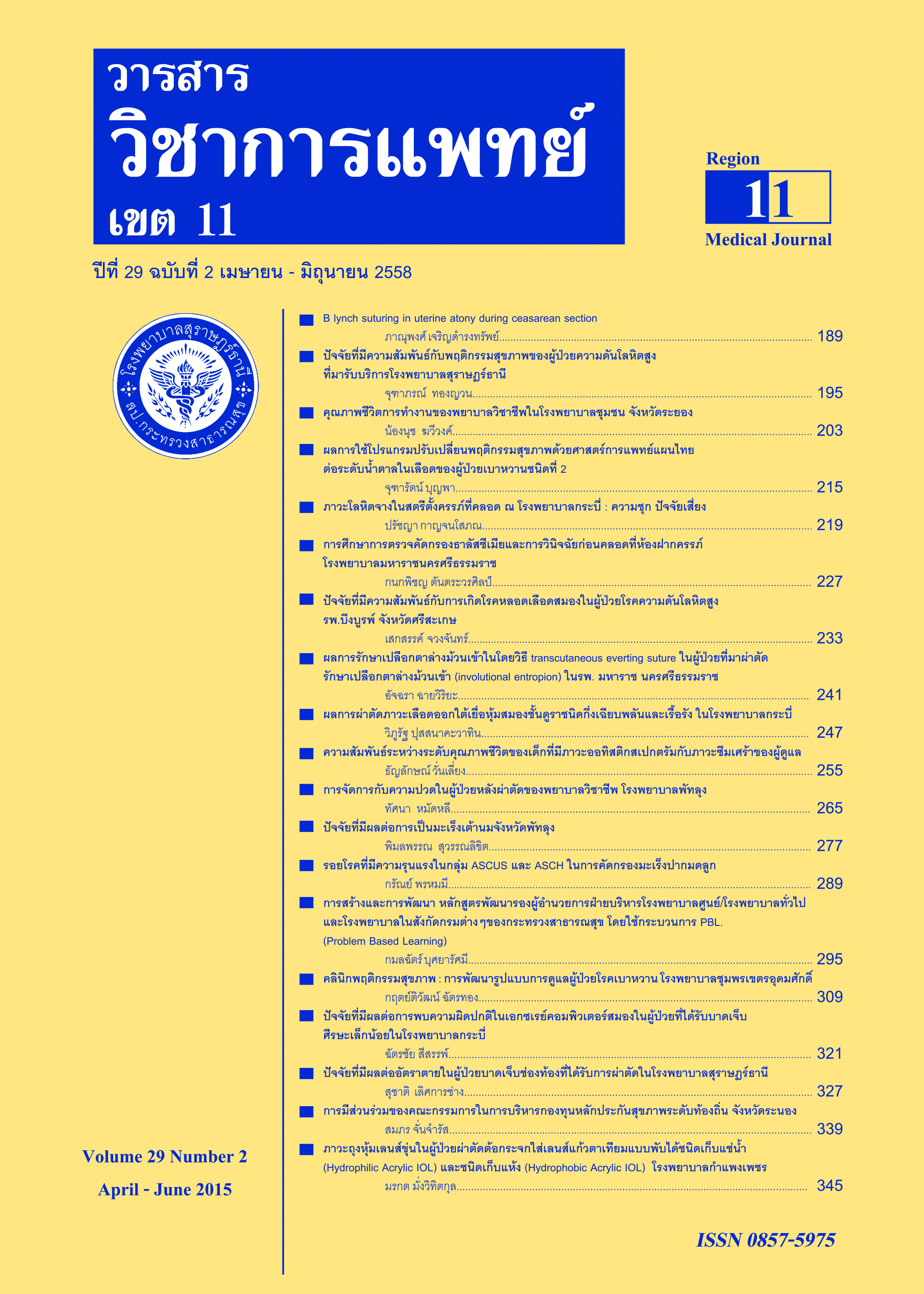Anemia in Pregnant Women Delivered at Krabi Hospital : Prevalence, Risk factors
Keywords:
Anemia in pregnancy, Prevalence, Risk factorsAbstract
Anemia is the most common hematological problems in pregnancy. Early diagnosis and cause identification of anemia could be reduced both maternal problems and effective treatment during pregnancy. Anemia in pregnancy is one of the indicators representing quality of care in obstetrics. 95% of pregnant women delivered at Krabi Hospital have antenatal care from other places. There is no official report of prevalence and risk factors of anemia in pregnancy at Krabi Hospital.
A descriptive study with retrospective data and analytical study for prevalence of anemia and risk factor in 4,892 pregnant women at Labor Room of Krabi Hospital and non limited gestational age since January 1,2013 to December 31, 2013. Main outcome measure : Hemotocrit level less than 33 percentin all gestation age. The prevalence of anemia in pregnancy is 31.87%. The mean value of hematocrit was 35.11% (SD3.61). The risk factors are age (p=0.001), number of gravidity(p=0.000), numbers of abortion (p=0.003) ,antenatal care(p=0.000) and underlying diseases(p=0.000). The prevalence of anemia in pregnancy is quite high. Therefore pregnant women in Krabi should be obtained early investigation and treatment. Risk factors would be beneficial not only screening for high risk pregnancy at antenatal clinic but also for any women at reproductive age to reduce the prevalence of anemia in Krabi
References
URL:http://www.who.int/rhl/pregnancy_childbirth/ medical/anaemia/cfcom/en/.
2. รศ.อ.นพ.วิเชียร มงคลศรีตระกูล . การตั้งครรภ์ VS เลือดจาง ...อันตรายแค่ไหน ? . Available from: URL: http://www.islammore.com/main/content.php%3F...
3. สำนักงานสาธารณสุขจังหวัดกระบี่.การประชุมวิชาการสาธารณสุขจังหวัดกระบี่ ประจำปี พ.ศ.2553: สำนักงานสาธารณสุขจังหวัดกระบี่;2553
4. พิชัย โชตินพรัตน์ภัทร,สมภพ ลิ้มพงศานุรักษ์,พงศ์ศักดิ์ จันทร์งาม. ความชุกของภาวะโลหิตจางในสตรีตั้งครรภ์ที่คลินิกฝากครรภ์โรงพยาบาลจุฬาลงกรณ์.จุฬาลงกรณ์เวชสาร 2546;47:223-30
5. Cunningham FG,Leveno KJ, Gilstrap lll LC, Wenstrom KD. Williams Obstetrics. 22nd ed. New York:Mc Graw-Hill;2005
6. Centers For Disease Control and Prevention. Recommendations to prevent and control iron deficiency in the United States. MMWR Recmm Rep (online) 1998 Apr (cited 2008 May 24);3(47 RR-3):(2 screens). Available from: URL: http://www. cdc.gov/mmwR/preview/mmwrhtml/00051880.htm
7. สุวิทย์ อุดมกิตติ, สายชล พฤกษ์ขจร. ภาวะโลหิตจางในสตรีตั้งครรภ์ที่มาฝากครรภ์ที่โรงพยาบาลพระนครศรีอยุธยา.วารสารวิชาการ รพศ/รพท เขต 4 2552; 11:46-52
8. รายิน อโรร่า ชยันตร์ธร ปทุมานนท์ ชไมพร ทวิชศรี . ภาวะโลหิตจางในสตรีที่มาฝากครรภ์ ณ โรงพยาบาลลำปาง : ความชุก สาเหตุ และปัจจัยเสี่ยง . ลำปางเวชสาร 2552; 30:28-35
9. ประเทือง เหลี่ยมพงศาพุทธิ,ชยันตร์ ปทุมานนท์,ชไมพร ทวิชศรี.ผลของภาวะโลหิตจางในหญิงตั้งครรภ์ต่อน้ำหนักทารกแรกคลอดเมื่อครรภ์ครบกำหนดที่โรงพยาบาลลำปาง.วารสารวิชาการสาธารณสุข 2547;13(4):559-66
10. ถวัลย์วงศ์ รัตนสิริ, ชุติมา เจริญสินทรัพย์. ความชุกของภาวะเลือดจางในสตรีตั้งครรภ์ที่มาฝากครรภ์ที่โรงพยาบาลศรีนครินทร์. ศรีนครินทร์เวชสาร 2547;19:189-97
11. Ogbeide O,Wagbutsoma V,Orhue A.Anemia in pregnancy.East Apr Med J 1994;71:671-3
12. Mahfong AA,Said MM,Alakija W,Badawi IA, Erian RA, Moneim MA. Anemia among pregnancy women in the Asia region. Southeast AsianJ Trop Med Pulbic Health 1994;25:251-8
13. Desalegn S. Prevalence of anemia in pregnancy in Jimatown.Ethiop Med J 1993;31:p251-8






